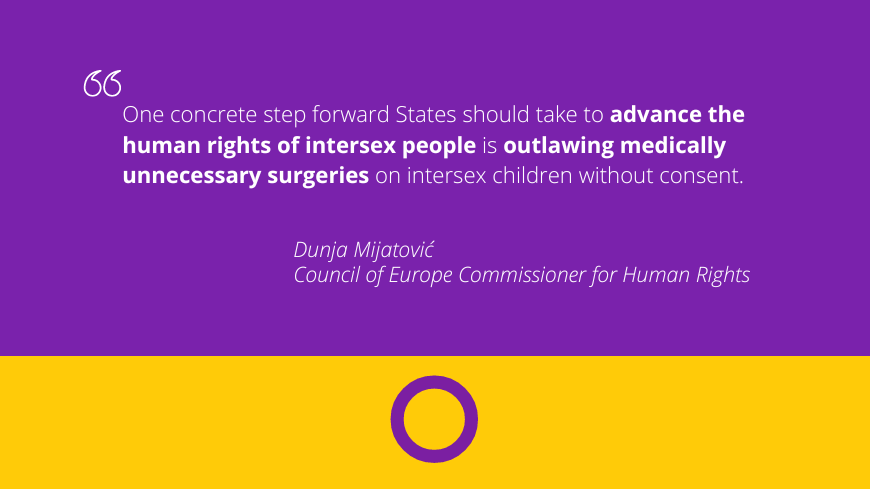At the Conference on Advancing the human rights of intersex people. High-Level session: launching the work on the drafting of a new Committee of Ministers Recommendation on equality of rights of intersex people, the Council of Europe Commissioner for Human Rights, Dunja Mijatović, gave the following speech:
I would like to thank the Icelandic Presidency and the Council of Europe SOGI unit for organising and supporting this important event.
Over the past years, we have seen positive developments for the rights of intersex people (some of which we have heard about today), and I have observed increasing awareness and momentum for change. This is surely reflected by the fact that, today, we are launching the work of the Steering Committee on Anti-Discrimination, Diversity and Inclusion (CDADI) towards a Recommendation on equality of rights of intersex people. And while we should celebrate this important milestone, I must also underline how urgently this work is needed.
My Office was one of the early international actors to shine a light on the human rights problems faced by intersex people – problems which were, and continue to be, left in the dark far too often. In 2015, my predecessor published an Issue Paper about human rights and intersex people providing a number of key recommendations that are still, for the most part, unimplemented by the Council of Europe member states. The challenges discussed there remain as relevant as ever. Being intersex is still heavily medicalised and pathologised. Laws, administrative and judicial procedures are still too inflexible, and lead to exclusion and discrimination in many walks of life. There remains a fundamental lack of understanding about intersex people, while individuals and families do not receive the support that they need. This, in turn, breeds stigma, violence and isolation.
I am hopeful that the new Recommendation will address these issues, and that intersex people and civil society will be key partners throughout its development. This will help to ensure that the language and approach used are human rights-based and avoid pathologising people who are intersex. I also hope that the process itself will be used as an opportunity to raise the profile of this group across Europe – and beyond.
But of course, the task of advancing human rights for intersex persons does not lie with one body, or one standard alone. All of the actors in this room play an important role, which requires courage, tenacity and support. We need member states, like Iceland, who are ready to be leaders in the field, pushing forward the agenda domestically and among their peers.
Experts and civil society have and will always be vital for securing advances. But to continue their work, they need adequate, sustainable funding and real opportunities to be involved in decision-making.
National human rights structures are an important avenue for intersex persons to seek justice. They can contribute to raising awareness about human rights issues faced by intersex people and provide guidance for their authorities to better tackle them.
Finally, one concrete step forward by the Council of Europe member states would be outlawing medically unnecessary surgeries on intersex children without consent. That would show willingness to contribute towards the well-being of the most vulnerable and the most affected by failed policies which undermine their rights.
Thank you.



